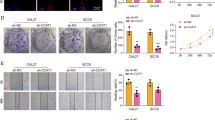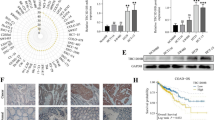Abstract
This study was designed to explore the influence of myelin protein zero-like protein 1 (MPZL1) on the stem-like properties of cancer cells and the underlying mechanism in lung adenocarcinoma. Real-time quantitative polymerase chain reaction (RT-qPCR) was utilized to evaluate mRNA expression level. CCK8, wound healing, and transwell assays were applied to assess cell proliferation, migration, and invasion. Tumorsphere-formation assay was utilized to assess cancer stem cell–like properties. LF3 was used to block the β-catenin/Transcription factor 4 (TCF-4) signaling. Xenograft nude mouse model was conducted; tumor weight and volume were recorded. Western blot assay was utilized to detect the expression levels of CD44, CD133, β-catenin, TCF-4, and MPZL1. Following MPZL1 knockdown, the mRNA expression levels of MPZL1, β-catenin, and TCF-4 were inhibited, while the mRNA expression levels of the above genes were increased after the MPZL1 overexpression. MPZL1 knockdown suppressed cell proliferation, migration, and invasion, reduced the tumorsphere-formation capacity, and restrained the expression levels of CD44 and CD133. However, MPZL1 overexpression promoted the cell proliferation, migration, and invasion, enhanced the tumorsphere-formation capacity, and increased the expression levels of CD44 and CD133. Interestingly, LF3 treatment partially revised the effect of MPZL1 overexpression. These findings were further corroborated by in vivo experiments. We concluded that MPZL1 could suppress the lung adenocarcinoma cells’ proliferation, migration, invasion, and lung cancer stem cells characteristics. The underlying mechanism is involved in the activation of β-catenin/TCF-4 signaling.






Similar content being viewed by others
Data availability
The dataset used and/or analyzed in this study is available from the corresponding author on reasonable request.
References
Beigbeder A, Chartier FJM, Bisson N (2017) MPZL1 forms a signalling complex with GRB2 adaptor and PTPN11 phosphatase in HER2-positive breast cancer cells. Sci Rep 7:11514. https://doi.org/10.1038/s41598-017-11876-9
Chen W, Zheng R, Baade PD et al (2016) Cancer statistics in China, 2015. CA Cancer J Clin 66:115–132. https://doi.org/10.3322/caac.21338
Dang HH, Ta HDK, Nguyen TTT et al (2022) Prospective role and immunotherapeutic targets of sideroflexin protein family in lung adenocarcinoma: evidence from bioinformatics validation. Funct Integr Genomics 22:1057–1072. https://doi.org/10.1007/s10142-022-00883-3
Fang L, Zhu Q, Neuenschwander M et al (2016) A small-molecule antagonist of the β-catenin/tcf4 interaction blocks the self-renewal of cancer stem cells and suppresses tumorigenesis. Cancer Res 76:891–901. https://doi.org/10.1158/0008-5472.Can-15-1519
Feng J, Ouyang H, Wang J et al (2022) MPZL1 upregulation promotes tumor metastasis and correlates with unfavorable prognosis in non-small cell lung cancer. Carcinogenesis 43:919–929. https://doi.org/10.1093/carcin/bgac055
Horta S, Agostinho AL, Mateus R et al (2015) Looking out for cancer stem cells’ properties: the value-driving role of CD44 for personalized medicines. Curr Cancer Drug Targets 14:832–849. https://doi.org/10.2174/1568009614666141111154713
Jia D, Jing Y, Zhang Z et al (2014) Amplification of MPZL1/PZR promotes tumor cell migration through Src-mediated phosphorylation of cortactin in hepatocellular carcinoma. Cell Res 24:204–217. https://doi.org/10.1038/cr.2013.158
Khan M, Khan M, Al-Marri AH et al (2016) Apoptosis inducing ability of silver decorated highly reduced graphene oxide nanocomposites in A549 lung cancer. Int J Nanomedicine 11:873–883. https://doi.org/10.2147/ijn.S100903
Kusano K, Thomas TN, Fujiwara K (2008) Phosphorylation and localization of protein-zero related (PZR) in cultured endothelial cells. Endothelium 15:127–136. https://doi.org/10.1080/10623320802125250
Li D, Yang W, Zhang J et al (2018) Transcription factor and lncRNA regulatory networks identify key elements in lung adenocarcinoma. Genes 9. https://doi.org/10.3390/genes9010012
Lin S, Huang C, Sun J et al (2019) The mitochondrial deoxyguanosine kinase is required for cancer cell stemness in lung adenocarcinoma. EMBO Mol Med 11:e10849. https://doi.org/10.15252/emmm.201910849
Liu Y, Wang H, Song K et al (2022) CroReLU: Cross-crossing space-based visual activation function for lung cancer pathology image recognition. Cancers 14. https://doi.org/10.3390/cancers14215181
Livak KJ, Schmittgen TD (2001) Analysis of relative gene expression data using real-time quantitative PCR and the 2(-Delta Delta C(T)) method. Methods (San Diego, Calif) 25:402–408. https://doi.org/10.1006/meth.2001.1262
National Research Council (1996) Guide for the care and use of laboratory animals. The National Academies Press, Washington, DC. https://doi.org/10.17226/5140
Plaks V, Kong N, Werb Z (2015) The cancer stem cell niche: how essential is the niche in regulating stemness of tumor cells? Cell Stem Cell 16:225–238. https://doi.org/10.1016/j.stem.2015.02.015
Reya T, Clevers H (2005) Wnt signalling in stem cells and cancer. Nature 434:843–850. https://doi.org/10.1038/nature03319
Sarode P, Zheng X, Giotopoulou GA et al (2020) Reprogramming of tumor-associated macrophages by targeting β-catenin/FOSL2/ARID5A signaling: A potential treatment of lung cancer. Sci Adv 6:eaaz6105. https://doi.org/10.1126/sciadv.aaz6105
Stromecki M, Tatari N, Morrison LC et al (2018) Characterization of a novel OTX2-driven stem cell program in Group 3 and Group 4 medulloblastoma. Mol Oncol 12:495–513. https://doi.org/10.1002/1878-0261.12177
Su C, Zhang J, Yarden Y et al (2021) The key roles of cancer stem cell-derived extracellular vesicles. Signal Transduct Target Ther 6:109. https://doi.org/10.1038/s41392-021-00499-2
Tan D, Zhang W, Tao Y et al (2019) PZR promotes metastasis of colorectal cancer through increasing FAK and Src phosphorylation. Acta Biochim Biophys Sin 51:356–364. https://doi.org/10.1093/abbs/gmz019
Tan Y, Chen B, Xu W et al (2014) Clinicopathological significance of CD133 in lung cancer: a meta-analysis. Mol Clin Oncol 2:111–115. https://doi.org/10.3892/mco.2013.195
Wang A, Fan F, Zang C et al (2023) MPZL1 promotes lung adenocarcinoma progression by enhancing tumor proliferation, invasion, migration, and suppressing immune function via transforming growth factor-β1. Hum Gene Ther 34:540–553. https://doi.org/10.1089/hum.2022.234
Wang J, Yuan Y, Tang L et al (2022) Long non-coding RNA-TMPO-AS1 as ceRNA binding to let-7c-5p upregulates STRIP2 expression and predicts poor prognosis in lung adenocarcinoma. Front Oncol 12:921200. https://doi.org/10.3389/fonc.2022.921200
Wang R, Bhattacharya R, Ye X et al (2017) Endothelial cells activate the cancer stem cell-associated NANOGP8 pathway in colorectal cancer cells in a paracrine fashion. Mol Oncol 11:1023–1034. https://doi.org/10.1002/1878-0261.12071
Xie F, Wang J, Zhang B (2023) RefFinder: a web-based tool for comprehensively analyzing and identifying reference genes. Funct Integr Genomics 23:125. https://doi.org/10.1007/s10142-023-01055-7
Ye Y, Gu J, Liu P et al (2020) Long Non-Coding RNA SPRY4-IT1 Reverses cisplatin resistance by downregulating MPZL-1 via suppressing EMT in NSCLC. OncoTargets Ther 13:2783–2793. https://doi.org/10.2147/ott.S232769
Ying C, Xiao BD, Qin Y et al (2018) GOLPH2-regulated oncolytic adenovirus, GD55, exerts strong killing effect on human prostate cancer stem-like cells in vitro and in vivo. Acta Pharmacol Sin 39:405–414. https://doi.org/10.1038/aps.2017.91
Zhao Z, Wang L, Bartom E et al (2019) β-Catenin/Tcf7l2-dependent transcriptional regulation of GLUT1 gene expression by Zic family proteins in colon cancer. Sci Adv 5:eaax0698. https://doi.org/10.1126/sciadv.aax0698
Funding
This study was supported by the Natural Science Research Project of Anhui Educational Committee (2022AH051513).
Author information
Authors and Affiliations
Contributions
Conceived and designed the study: Ansheng Wang and Qiao Ge; performed the literature search and data extraction: Chao Li, Haining Hong, and Kangwu Wang; analyzed the data: Chao Zhou, Chao Zang, and Liwei Chen; Drafted the manuscript: Ansheng Wang and Haonan Zhu.
Corresponding authors
Ethics declarations
Ethics approval and consent participate
The experimental procedure followed the US National Institutes of Health Guide for the Care and Use of Laboratory Animals (National Research Council, 1996). The study protocol was approved by the Animal Ethics Committee of Bengbu Medical College (approval number: 2023-436).
Conflict of interest
The authors declare no competing interests.
Additional information
Publisher’s Note
Springer Nature remains neutral with regard to jurisdictional claims in published maps and institutional affiliations.
Rights and permissions
Springer Nature or its licensor (e.g. a society or other partner) holds exclusive rights to this article under a publishing agreement with the author(s) or other rightsholder(s); author self-archiving of the accepted manuscript version of this article is solely governed by the terms of such publishing agreement and applicable law.
About this article
Cite this article
Ge, Q., Zhou, C., Zang, C. et al. MPZL1 suppresses the cancer stem-like properties of lung cancer through β-catenin/TCF4 signaling. Funct Integr Genomics 23, 304 (2023). https://doi.org/10.1007/s10142-023-01232-8
Received:
Revised:
Accepted:
Published:
DOI: https://doi.org/10.1007/s10142-023-01232-8




